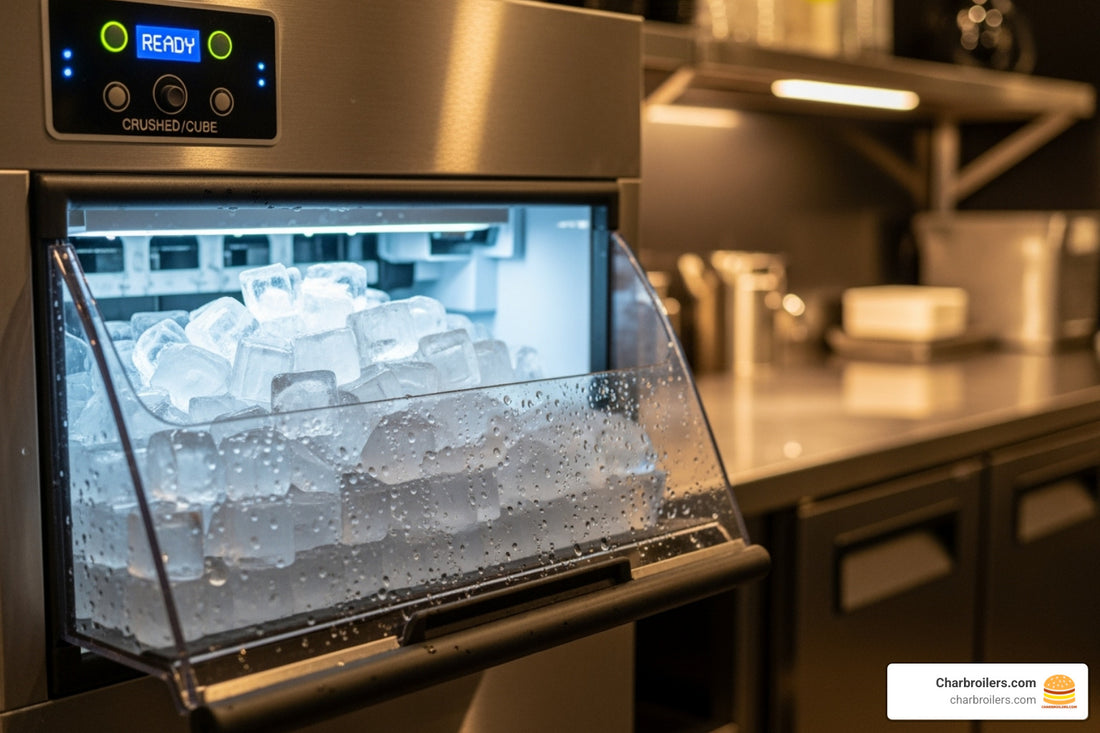
Stay Cool Under Pressure – Commercial Ice Makers Machines Reviewed
Share
Why Every Foodservice Business Needs Reliable Ice Production
Commercial ice makers machines are essential for restaurants, bars, hotels, and healthcare facilities that need consistent, high-quality ice. These machines range from compact undercounter units producing 100 lbs per day to large modular systems capable of over 1,000 lbs daily, with prices typically falling between $1,000 to $4,500 depending on capacity and features.
Key Commercial Ice Maker Types:
- Modular units - High-capacity systems with separate ice head and storage bin
- Undercounter models - All-in-one compact units perfect for bars and small kitchens
- Countertop dispensers - Self-service units ideal for healthcare and office settings
- Ice vending machines - High-capacity storage (up to 6,500 lbs) for 24/7 availability
Essential Buying Factors:
- Production capacity - Match daily ice needs to machine output
- Cooling method - Air-cooled (cost-effective) vs water-cooled (hot environments)
- Ice type - Full cubes, nugget, flake, or specialty shapes for specific uses
- Energy efficiency - ENERGY STAR certified models reduce utility costs
Whether serving craft cocktails that need slow-melting full cubes or operating a healthcare facility requiring chewable nugget ice, choosing the right commercial ice maker impacts your customer experience and operational efficiency. Poor ice quality, like cloudy cubes that melt too fast, can ruin drinks and frustrate customers.
I'm Sean Kearney from Charbroilers.com, and with over a decade in the restaurant equipment industry, I've helped countless businesses find the perfect commercial ice makers machines to meet their specific needs. My experience has taught me that the right equipment makes all the difference in foodservice success.
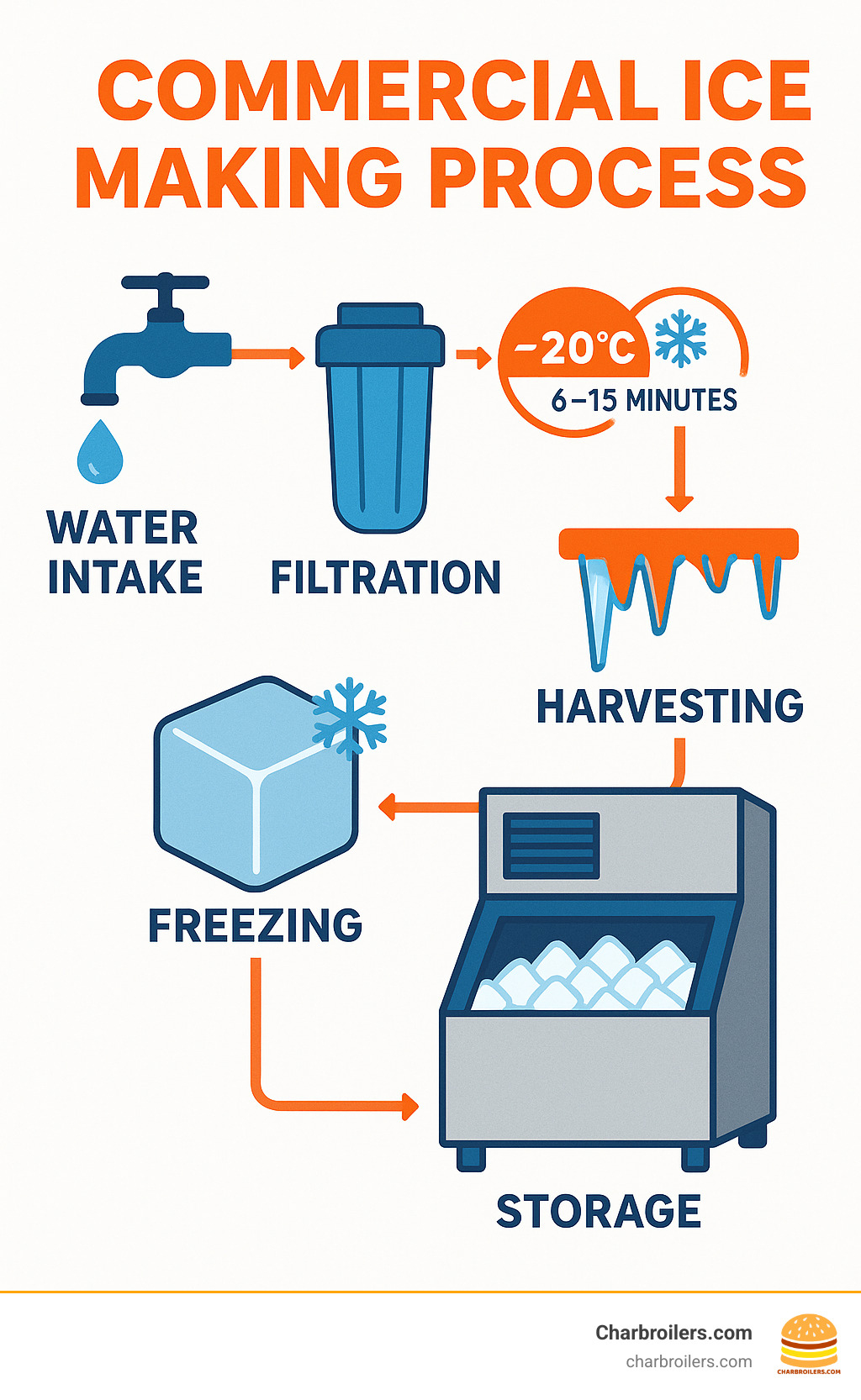
Commercial ice makers machines word guide:
Decoding the Ice: Types of Commercial Ice Makers and Their Best Uses
Choosing the right commercial ice makers machines means matching the equipment to your specific needs. A busy hotel lobby requires a different approach than a cozy café, and understanding these differences will save you money and headaches.
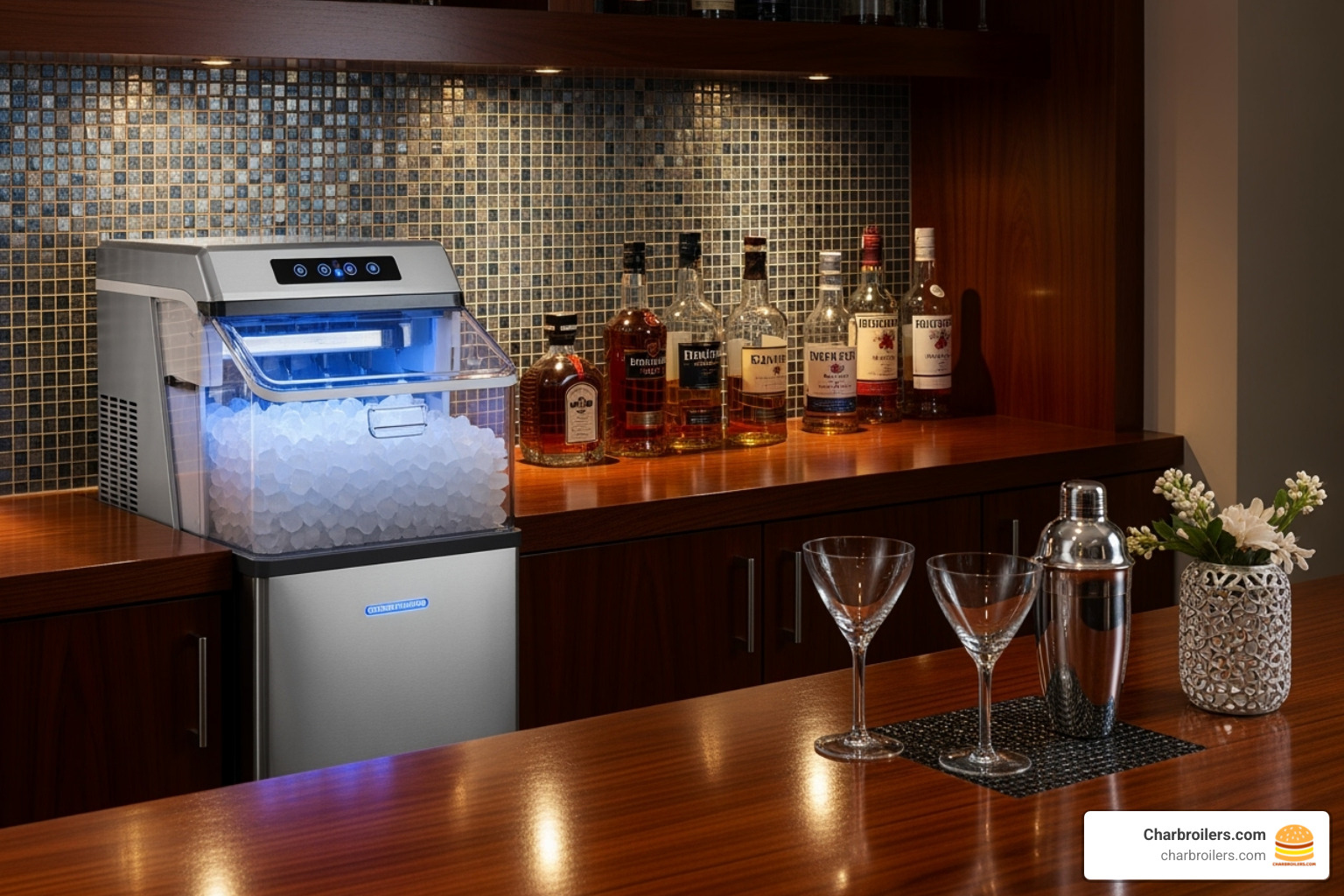
Today's commercial ice makers machines are versatile. Whether you're running a high-volume kitchen that needs hundreds of pounds of ice daily or looking for a space-saving solution, there's a machine designed for your situation.
Modular Ice Machines
Think of modular ice machines as the workhorses of the ice world. These high-capacity powerhouses feature a separate ice-making head and storage bin, giving you flexibility to create customizable setups that grow with your business.
Their key appeal is production flexibility. You can start with one configuration and easily upgrade it as your needs change. Need more storage? Swap in a larger bin. Want a different type of ice? Change out the head unit.
These machines are ideal for restaurants and hotels where consistent, high-volume ice production is essential. Large institutional kitchens also rely on modular systems because they can handle a demanding pace without fail.
Learn more about modular commercial ice makers on Charbroilers.com.
Undercounter Ice Makers
When space is tight, undercounter ice makers are the solution. These clever all-in-one designs pack both the ice-making mechanism and built-in storage into a compact footprint that slides neatly under your counter.
Undercounter units deliver ice exactly where you need it most. Perfect for bars, cafes, and offices, these machines eliminate the need to trek across the kitchen for ice. Your bartenders can grab fresh ice without leaving their station during a rush.
While they typically have a lower production volume than modular systems, they're perfectly sized for businesses with moderate ice needs or as a convenient supplement to your main ice supply.
Find top undercounter commercial ice makers for your business.
Countertop Ice & Water Dispensers
Countertop ice and water dispensers bring self-service convenience to your customers and staff, often featuring popular nugget ice that's perfect for sodas and smoothies.
These dispensers are ideal where hygiene is a priority. Ideal for healthcare facilities and office breakrooms, many models now offer touchless dispensing options that keep germs at bay while delivering fresh ice and water on demand.
The hygienic solution these dispensers provide has become increasingly important. Staff and customers can get what they need without touching handles or scooping ice.
Explore commercial ice machines for hotels, offices, and more.
Ice and Water Vending Machines
Ice and water vending machines are designed for entrepreneurs and businesses that want to turn ice into a profit center.
These impressive machines boast high storage capacity of up to 6,500 lbs and offer 24/7 availability to customers. What makes them attractive is their minimal maintenance requirement; they produce ice on-site, so there's no need for constant restocking.
These machines are suited for a variety of business types, from standalone vending operations to retail locations looking to boost profit margins. They connect directly to water and electricity lines and handle everything else automatically.
The Ultimate Buyer's Guide to Commercial Ice Makers Machines
Choosing the right commercial ice makers machines is a strategic investment that impacts your efficiency, customer satisfaction, and bottom line. Many owners rush this purchase and end up with a machine that doesn't meet their needs.
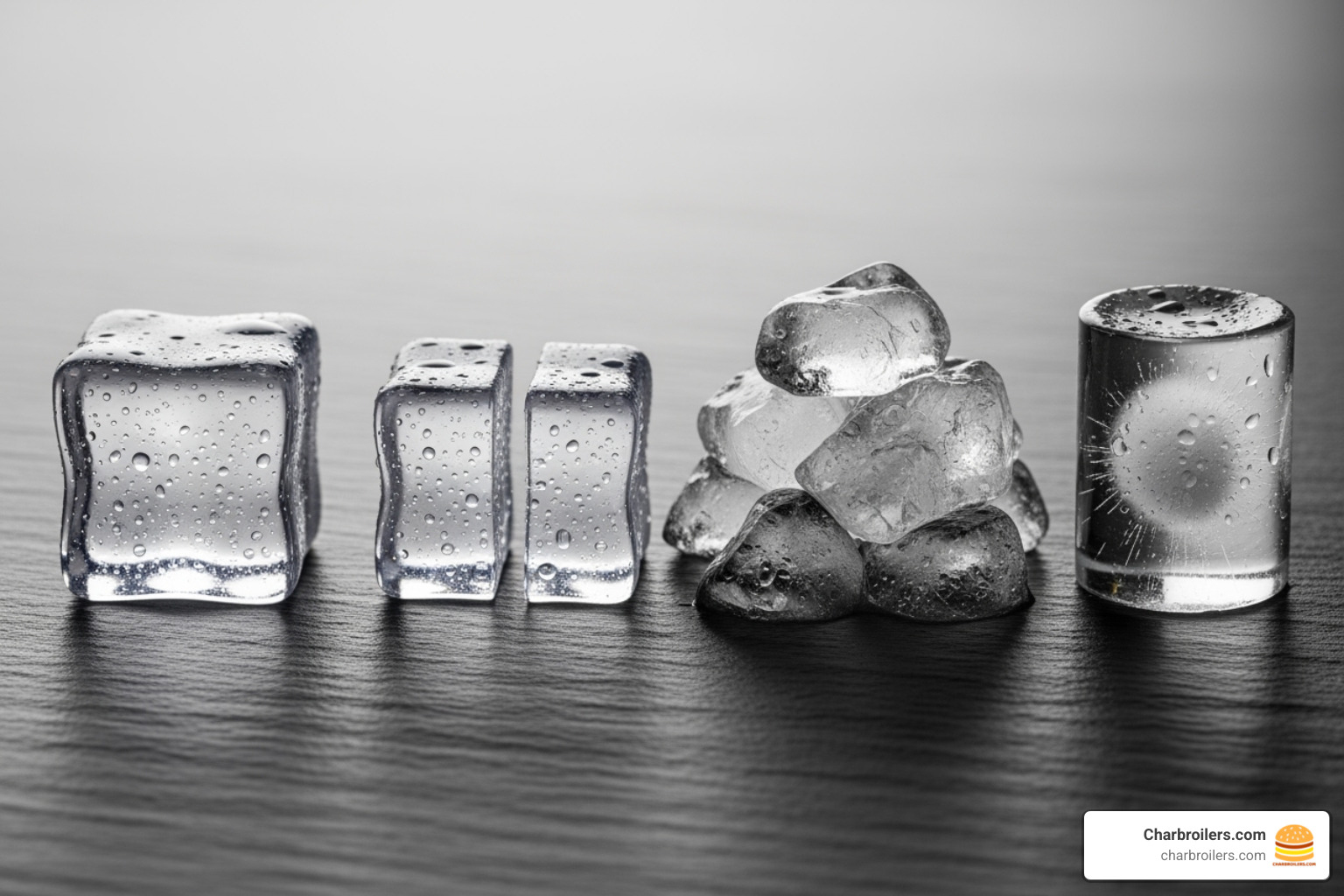
There are several critical factors to weigh, from the type of ice you need to the machine's cooling method and long-term costs. Let's break down these essentials to ensure you select a machine that serves your business.
Match the Ice to the Occasion
Not all ice is created equal, and the type you serve can make or break the customer experience. For example, fast-melting cubes can water down a premium whiskey in minutes.
Full cubes (7/8" x 7/8") are the standard for cocktails and spirits. These dense, slow-melting cubes preserve flavor and look sophisticated in a glass.
Half cubes (3/8" x 7/8" x 7/8") offer more versatility for general beverage service. They're excellent for blended drinks and soft drinks because they cool drinks quickly.
Nugget ice, often called "chewable ice," is popular in healthcare, convenience stores, and fast-food restaurants. Its soft texture absorbs flavors, making it perfect for sodas. Patients in healthcare facilities appreciate its chewable nature.
Flake ice is your go-to for food displays. This soft, malleable ice molds around seafood and produce without bruising them. It's also used in healthcare for cold packs.
For upscale establishments, gourmet ice types like spheres or large 2x2 cubes lift the drinking experience. These specialty shapes are designed for high-end bars where presentation matters.
Find the right commercial crushed ice maker for your needs
Sizing Up Your Needs: Capacity, Cooling, and Cost
Once you've chosen your ice type, it's time for practical considerations. Getting these wrong can lead to wasted energy or lost sales.
Production capacity is measured in pounds of ice produced per 24 hours. I always tell clients to calculate their busiest day's needs, then add a 20% buffer. Commercial ice makers machines range from 100 lbs to over 1,000 lbs per day. Overestimating wastes energy, but underestimating leaves you scrambling for ice.
The cooling system depends on your environment. Air-cooled units are cost-effective and work well in cooler, ventilated spaces but struggle in hot, enclosed areas.
Water-cooled systems excel in hot kitchens or areas with poor airflow. They use water to cool the condenser, which incurs additional water costs but is very efficient in high ambient temperatures.
Remote condenser systems are ideal where noise and heat are major concerns. The noisy, heat-generating condenser sits outside, allowing the ice machine to operate quietly indoors.
Cost considerations go beyond the initial price of $1,000 to $4,500. Factor in installation, water filtration, and utility costs. ENERGY STAR certified machines save money on electricity and water, a win-win that pays dividends over time.
Key Features to Look for in Commercial Ice Makers Machines
The difference between a good machine and a great one is in the details. Stainless steel construction ensures durability and easier cleaning.
Antimicrobial technology has become important, with some manufacturers embedding agents into components to inhibit bacteria, mold, and algae growth, ensuring cleaner ice.
Modern advanced diagnostics and intuitive control panels simplify operation and troubleshooting, saving time and money on service calls.
Look for automatic cleaning cycles that make routine maintenance less labor-intensive.
Most importantly, ensure your machine carries NSF and ETL certifications. These indicate the equipment meets stringent public health and safety standards for commercial food service.
To Buy or To Lease? Exploring Your Options
The decision between buying and leasing commercial ice makers machines comes down to cash flow and maintenance preferences. Purchasing outright means you own the asset but requires substantial upfront capital.
Leasing and subscription services have become popular. Monthly fees typically include the machine, maintenance, cleaning, and repairs. This means predictable costs, no large upfront investment, and peace of mind.
These flexible programs can be customized to fit a business's budget and operational needs. For many owners, the ability to focus on their business instead of maintaining equipment makes leasing an attractive option.
Renting commercial ice machines made easy with Charbroilers.com
Whether you buy or lease, ensuring your ice supply never runs out is paramount. Nobody wants a warm drink on a hot day.
Keeping It Cool and Clean: Essential Ice Machine Maintenance
Ice is considered a food product by the FDA, so your commercial ice makers machines need the same careful attention as any kitchen ingredient. Neglecting maintenance can lead to customer complaints about bad-tasting ice or even health code violations.
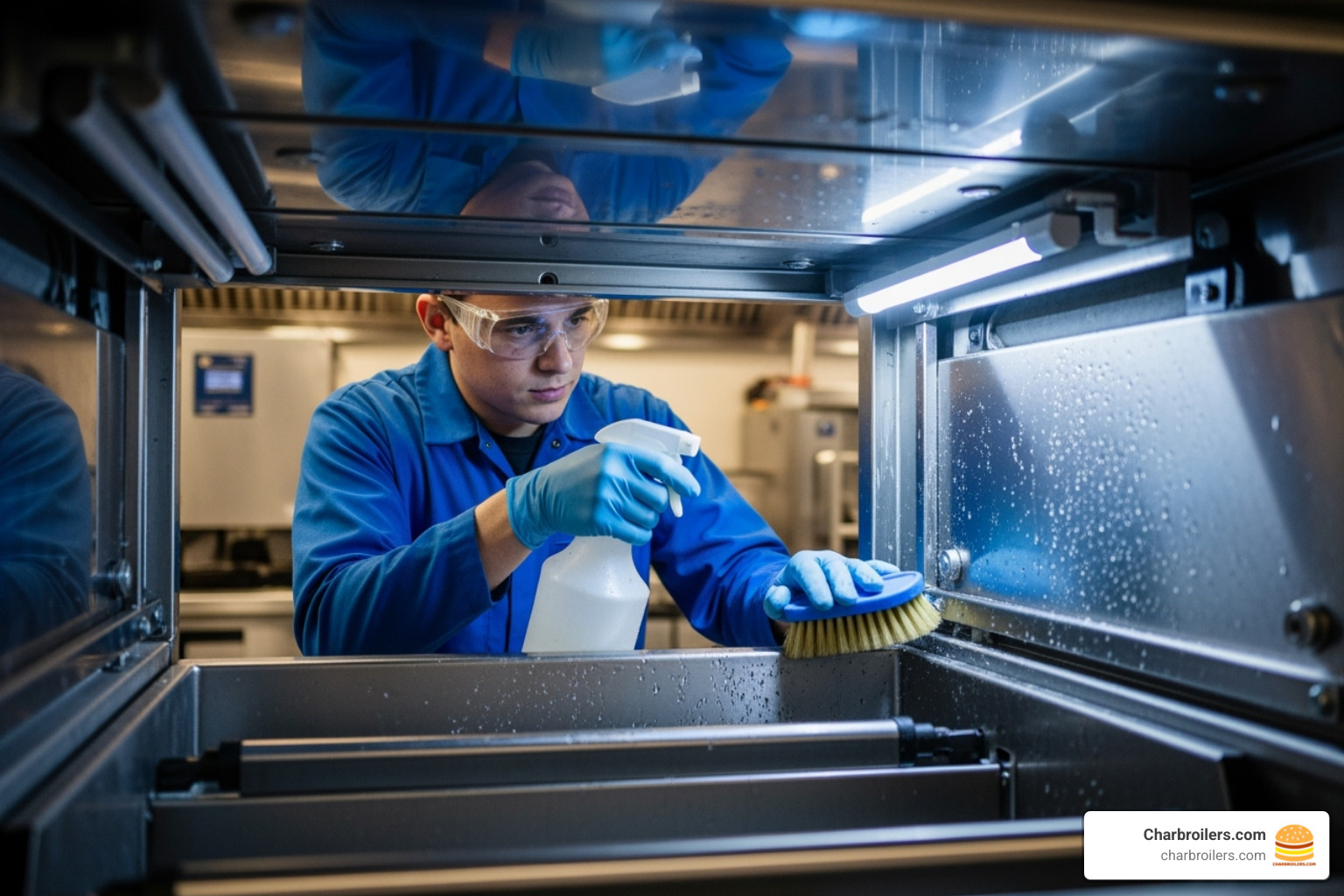
Regular maintenance protects your customers' health, maintains your reputation, and helps you avoid expensive emergency repair calls.
Signs Your Ice Maker Needs Service
Your ice machine will show warning signs when it needs service. Look for these red flags before a small problem becomes an expensive one.
Poor ice quality is usually the first sign. When cubes come out small, cloudy, or soft, the machine needs attention. Ice that melts faster than usual is another giveaway.
Bad taste or odor in your ice is unacceptable. If your ice has any taste or smell, you likely have bacterial growth or mineral buildup.
Reduced ice production can sneak up on you. If you're suddenly running out of ice during peak hours, scale buildup may be choking your machine's efficiency.
Unusual noises like grinding or banging mean mechanical parts are struggling and need immediate attention.
Visible mold or slime is an emergency signal. Any black, pink, or green discoloration inside your bin or on parts is a health hazard that requires you to stop and clean immediately.
A Step-by-Step Guide to Cleaning Your Commercial Ice Makers Machines
Most commercial ice makers machines need a thorough cleaning every 3-6 months, though poor water quality or high-use environments may require more frequent attention.
Safety first. Turn off the machine and shut off the water supply before you start.
Empty everything. Remove and discard all ice from the storage bin. Drain any standing water from the machine.
Disassemble removable parts. Check your manual for parts like the water curtain or distribution tube that can be safely removed for better access.
Use approved cleaning solutions. Use commercial ice machine cleaner and sanitizer as directed. Apply this solution to all parts that touch water or ice.
Scrub gently. Use a soft brush or cloth to remove scale and buildup without scratching the equipment.
Rinse thoroughly. Remove every trace of cleaning solution with clean water to avoid contaminating your ice.
Dry completely before reassembling. Wipe down what you can, then let everything air dry.
Discard the first batch of ice made after cleaning to flush out any remaining solution. The second batch should be clear and tasteless.
The Role of Water Filtration
The quality of water going into your machine is as important as cleaning. Proper water filtration acts as a protective shield for your commercial ice makers machines.
Good filtration prevents scale and mineral buildup that can clog internal components. Hard water minerals like calcium and magnesium reduce efficiency and production.
It also protects internal parts from sediment that can wear down pumps and valves. This small investment prevents major problems.
Better ice quality is the immediate payoff. Filters remove chlorine and dissolved solids that make ice cloudy and taste bad.
Proper filtration extends your machine's life significantly by reducing stress on components and preventing mineral damage.
Frequently Asked Questions about Commercial Ice Makers
After helping hundreds of businesses choose the perfect commercial ice makers machines, I've noticed the same questions come up. Here are the answers that matter most when making this important investment.
How much ice do I need for my business?
This is the most important question to get right. Too little capacity and you'll run out of ice during a rush; too much and you're wasting money on an oversized machine.
The key is understanding your specific business type and peak demand. Restaurants typically need about 1.5 pounds of ice per customer. A cocktail bar might need closer to 3 pounds per seat. Fast-food operations usually need less, around 0.9 pounds per customer, since most ice goes into fountain drinks.
Healthcare facilities require about 5-10 pounds per patient bed for hydration and therapeutic packs. Hotels should plan for roughly 5 pounds per room for hallway ice machines.
Don't forget climate and other uses. A seafood restaurant in a hot climate will need more ice than a coffee shop in a cool one. Factor in ice for food displays and back-of-house cooling.
My advice: Calculate your baseline needs, then add a 20% buffer. It's better to have extra ice than to run out.
How often should I clean my commercial ice maker?
The FDA considers ice a food product, so your commercial ice makers machines need the same attention as other food prep equipment.
The minimum cleaning schedule is every 3-6 months, but some factors require more frequent cleaning. A high-yeast environment like a bakery or brewery will accelerate mold growth.
Poor water quality without proper filtration leads to faster mineral buildup, reducing efficiency. Heavy usage also means contaminants accumulate quicker.
Watch for warning signs: cloudy or soft ice, unusual tastes or odors, reduced production, strange noises, or visible mold. When you see these, don't wait for your scheduled cleaning—address the issue immediately.
Regular maintenance pays off in machine longevity, energy efficiency, and the quality of ice you serve.
What is the difference between a commercial and residential ice maker?
Business owners often wonder if they can save money with a residential unit, but it's not worth the risk.
Commercial ice makers machines are built for different demands. A residential unit might produce 20-50 pounds of ice per day, while commercial units are designed for continuous, high-volume production of hundreds or thousands of pounds daily.
The construction is also different. Commercial units use heavy-duty stainless steel components designed to run 24/7 in a busy kitchen.
Drain requirements are another major difference. Commercial machines handle large volumes of water and typically require dedicated floor drains or pumps.
Most importantly, commercial ice makers machines must meet strict NSF and ETL certifications for food safety, which residential units do not have.
The price difference reflects these capabilities. While residential models cost a few hundred dollars, commercial units range from $1,000 to $4,500 because they're engineered for the demanding operation your business requires.
Your Partner for a Cooler Business
Choosing the right commercial ice makers machines is more than just picking equipment—it's about investing in your business's success. Throughout this guide, we've covered everything from matching ice types to specific uses, understanding production capacities and cooling methods, and maintaining your equipment for peak performance. These details might seem small, but they add up to create the seamless experience your customers expect.
Think about it: nobody remembers a perfectly chilled drink, but everyone remembers when their cocktail arrives watery or their soda lacks that satisfying ice-cold bite. The right ice machine working behind the scenes ensures those disappointing moments never happen in your establishment.
At Charbroilers.com, we understand that your kitchen is the heart of your business. Just as we help you find the perfect charbroiler to create those signature grill marks or the ideal deep fryer for crispy perfection, we're committed to helping you steer commercial ice makers machines. Our wide selection means you'll find exactly what your operation needs, whether you're running a busy hotel bar or an intimate neighborhood café.
What sets us apart is our understanding of the foodservice industry's unique challenges. We know that every dollar counts, which is why we offer custom financing options that work with your budget and cash flow. You shouldn't have to choose between quality equipment and financial stability—our flexible payment solutions ensure you can have both.
Don't let unreliable ice production become the weak link in your operation. A steady supply of clean, high-quality ice is one of those invisible foundations that separates professional establishments from amateur ones. Whether you're opening your first location or upgrading existing equipment, we're here to guide you toward the smartest investment for your specific needs.
Ice Ice Baby: Best Commercial Ice Making Equipment to Keep Your Business Cool
Your kitchen deserves equipment that works as hard as you do. While you're planning your ice solution, take a moment to explore our other essential guides that can transform your entire operation.
View our complete guide to commercial charbroilers for your restaurant
